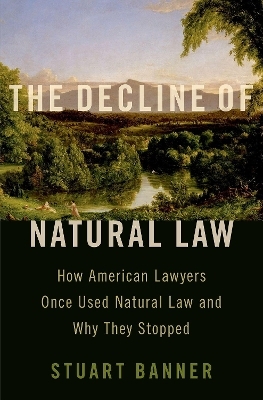
The Decline of Natural Law
How American Lawyers Once Used Natural Law and Why They Stopped
Seiten
2021
Oxford University Press Inc (Verlag)
978-0-19-755649-8 (ISBN)
Oxford University Press Inc (Verlag)
978-0-19-755649-8 (ISBN)
An account of a fundamental change in American legal thought, from a conception of law as something found in nature to one in which law is entirely a human creation.
Before the late 19th century, natural law played an important role in the American legal system. Lawyers routinely used it in their arguments and judges often relied upon it in their opinions. Today, by contrast, natural law plays virtually no role in the legal system. When natural law was part of a lawyer's toolkit, lawyers thought of judges as finders of the law, but when natural law dropped out of the legal system, lawyers began thinking of judges as makers of the law instead.
In The Decline of Natural Law, the eminent legal historian Stuart Banner explores the causes and consequences of this change. To do this, Banner discusses the ways in which lawyers used natural law and why the concept seemed reasonable to them. He further examines several long-term trends in legal thought that weakened the position of natural law, including the use of written constitutions, the gradual separation of the spheres of law and religion, the rapid growth of legal publishing, and the position of natural law in some of the 19th century's most contested legal issues. And finally, he describes both the profession's rejection of natural law in the late 19th and early 20th centuries and the ways in which the legal system responded to the absence of natural law.
The first book to explain how natural law once worked in the American legal system, The Decline of Natural Law offers a unique look into how and why this major shift in legal thought happened, and focuses, in particular, on the shift from the idea that law is something we find to something we make.
Before the late 19th century, natural law played an important role in the American legal system. Lawyers routinely used it in their arguments and judges often relied upon it in their opinions. Today, by contrast, natural law plays virtually no role in the legal system. When natural law was part of a lawyer's toolkit, lawyers thought of judges as finders of the law, but when natural law dropped out of the legal system, lawyers began thinking of judges as makers of the law instead.
In The Decline of Natural Law, the eminent legal historian Stuart Banner explores the causes and consequences of this change. To do this, Banner discusses the ways in which lawyers used natural law and why the concept seemed reasonable to them. He further examines several long-term trends in legal thought that weakened the position of natural law, including the use of written constitutions, the gradual separation of the spheres of law and religion, the rapid growth of legal publishing, and the position of natural law in some of the 19th century's most contested legal issues. And finally, he describes both the profession's rejection of natural law in the late 19th and early 20th centuries and the ways in which the legal system responded to the absence of natural law.
The first book to explain how natural law once worked in the American legal system, The Decline of Natural Law offers a unique look into how and why this major shift in legal thought happened, and focuses, in particular, on the shift from the idea that law is something we find to something we make.
Stuart Banner is the Norman Abrams Distinguished Professor of Law at UCLA. His nine previous books include Speculation: A History of the Fine Line Between Gambling and Investing and The Baseball Trust: A History of Baseball's Antitrust Exemption.
Introduction
Part I: Before the Transition
Chapter 1: The Law of Nature
Chapter 2: The Common Law
Part II: Causes of the Transition
Chapter 3: The Adoption of Written Constitutions
Chapter 4: The Separation of Law and Religion
Chapter 5: The Explosion in Law Publishing
Chapter 6: The Two-Sidedness of Natural Law
Part III: The Transition and After
Chapter 7: The Decline of Natural Law and Custom
Chapter 8: Substitutes for Natural Law
Chapter 9: Echoes of Natural Law
Index
| Erscheinungsdatum | 28.04.2021 |
|---|---|
| Verlagsort | New York |
| Sprache | englisch |
| Maße | 236 x 160 mm |
| Gewicht | 522 g |
| Themenwelt | Geschichte ► Teilgebiete der Geschichte ► Militärgeschichte |
| Recht / Steuern ► Allgemeines / Lexika | |
| Recht / Steuern ► EU / Internationales Recht | |
| Recht / Steuern ► Öffentliches Recht | |
| Recht / Steuern ► Privatrecht / Bürgerliches Recht ► Berufs-/Gebührenrecht | |
| Recht / Steuern ► Rechtsgeschichte | |
| ISBN-10 | 0-19-755649-3 / 0197556493 |
| ISBN-13 | 978-0-19-755649-8 / 9780197556498 |
| Zustand | Neuware |
| Haben Sie eine Frage zum Produkt? |
Mehr entdecken
aus dem Bereich
aus dem Bereich
neueste Manipulationstechniken als Waffengattung der NATO
Buch | Softcover (2023)
Westend (Verlag)
24,00 €
Deutschlands Schwäche in der Zeitenwende
Buch | Softcover (2023)
C.H.Beck (Verlag)
18,00 €


